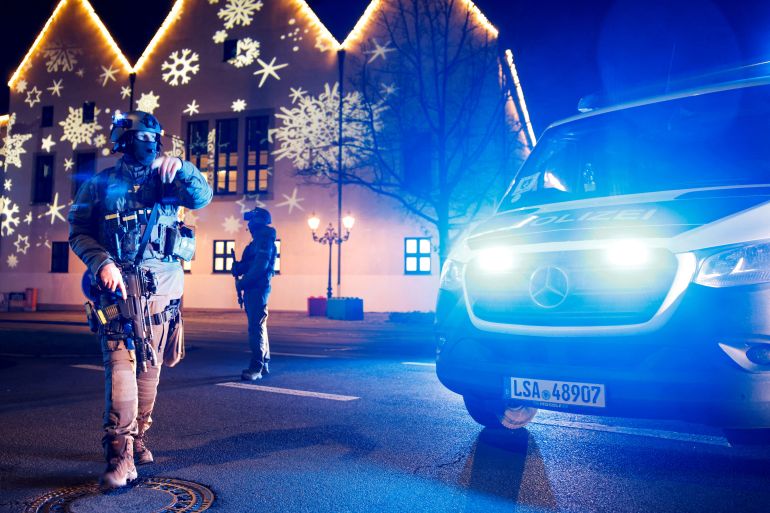DEVELOPING STORYDEVELOPING STORY,
At least two dead as car slams into crowded Christmas market in Germany
The driver involved in the ramming has been taken into custody, with officials calling the incident an attack.
Police cordon off a Christmas market in Magdeburg, Germany, on December 20 after a car rammed into a crowd of people [Axel Schmidt/Reuters]Published On 20 Dec 202420 Dec 2024
At least two people are dead and as many as 68 injured after a car rammed into a crowded Christmas market in the city of Magdeburg, the capital of the central German state of Saxony-Anhalt.
Officials on Friday night described the incident as an intentional attack and announced the driver has been taken into custody.
German Chancellor Olaf Scholz was among the many offering their condolences in the immediate aftermath.
“My thoughts are with the victims and their families,” Scholz wrote on the social media platform X.
“We stand by their side and by the side of the people of Magdeburg. My thanks go to the dedicated rescue workers in these anxious hours.”
The interior minister for Saxony-Anhalt, Tamara Zieschang, identified the suspect as a 50-year-old doctor from Saudi Arabia who arrived in Germany in 2006.
Another state official, Premier Reiner Haseloff, told a local news outlets that one of the dead was a child and the other an adult. He added he could not say whether there would be further deaths as a result of the suspected attack.
Advertisement
“That is speculation now. Every human life that has fallen victim to this attack is a terrible tragedy and one human life too many,” Haseloff told reporters.
He said that officials currently believe the suspect in custody was the sole perpetrator behind the car ramming.
“As things stand, he is a lone perpetrator, so that as far as we know there is no further danger to the city,” Haseloff told reporters.
Among the injured, 15 were identified as being in critical condition, according to the city government’s website. Another 37 people had injuries of medium severity and 16 were lightly injured.
Local media reports indicate the car involved was seen to be driving at high speeds, before striking the crowd at around 7pm local time (18:00 GMT).
Christmas markets are a tradition dating back to the Middle Ages in German-speaking parts of Europe, and in Magdeburg, a city of around 240,000 residents, the market was set up in a town square, with stalls selling regional food and drink.
Al Jazeera correspondent Dominic Kane, who was headed to the scene of Friday’s suspected attack, said the Christmas market would have been especially crowded when the car struck.
“ It’s the last Friday before Christmas. It’s the tradition all over Germany that Christmas markets are places that people go to, especially on Friday night,” Kane said.
“And then think about the physical geography of the market concerned, where it is. It’s not that far from the town of all, not that far from the river Elbe, in quite a picturesque city actually. So there will have been lots of reasons for people to be in the center of the city at the time.”
Advertisement
“It’s a terrible tragedy. This is a catastrophe for the city of Magdeburg and for the state, and for German generally as well,” Haseloff said. “It is really one of the worst things one can imagine, particularly in connection with what a Christmas market should bring.”
Friday night’s suspected attack comes eight years after a similar car ramming in the German capital of Berlin on December 19, 2016.
In that case, a Tunisian suspect, 24-year-old Anis Amri, intentionally drove a truck into a Christmas market in a major public square, Breitscheidplatz. Twelve people were killed, and as many as 56 wounded.
Raphael Bossong, a senior associate at the German Institute for International and Security Affairs, speculated that the two incidents could be related.
“ Unfortunately, this is a very sad anniversary, and I’m sure the perpetrator shows this thing for that purpose, to bring up this memory,” Bossong told Al Jazeera shortly after the news broke.
He added that Friday’s suspected attack will likely have political repercussions in Germany, which is slated to hold federal elections in 2025.
“We are entering an election period, and the German debate is already very polarized around these issues of migration,” Bossong explained. “I’m sure this will only add fuel to the fire, as sad as it is.”
In particular, security arrangements — both at the market and in the country as a whole — are likely to come under scrutiny.
“All Christmas markets and all these facilities in general now are supposed to be cordoned off against traffic, in the sense that since no car and no lorry could drive into them,” Bossong told Al Jazeera. “Probably the authorities will have to do some explaining.”
Advertisement
More details to follow.
